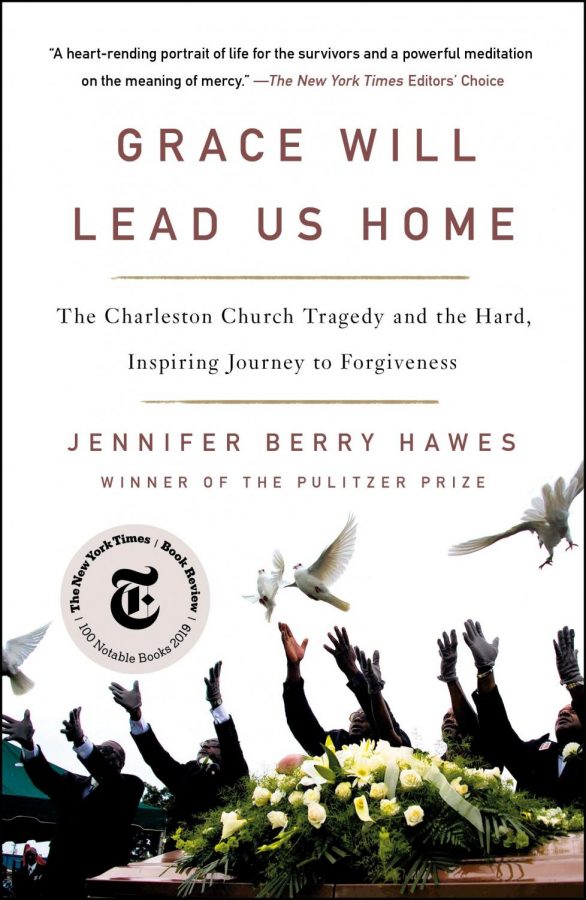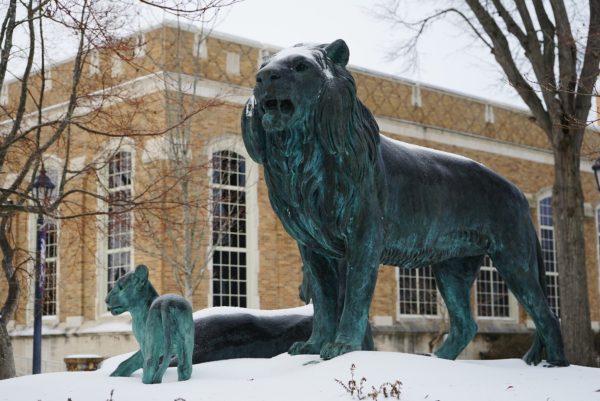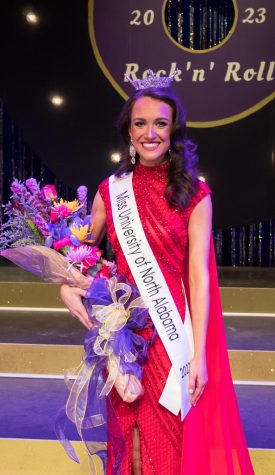UNA’s One Book selection, ‘Grace Will Lead Us Home’
CAMPUS NEWS
October 7, 2021
In 2019, The University of North Alabama’s Collier Library began its “One Book” program. The program acts as a campus-wide book-club, selecting a common read for all students, faculty and staff on campus. With the selected title, the program seeks to support open-discussion of diversity, differing view-points and varied life experiences across the university.
The 2021 selected “One Book” was the 2019 release, “Grace Will Lead Us Home: The Charleston Church Massacre and the Hard, Inspiring Journey to Forgiveness’’ by Jennifer Berry Hawes.
Hawes is currently a reporter at The Post and Courier in Charleston, where she is a part of the Watchdog and Public Service team, focusing on in-depth investigative work. In 2015, her team won a Pulitzer Prize for a series on domestic violence called “Till Death Do Us Part.”
“Grace Will Lead Us Home,” centers around the survivors of the 2015 shooting at Emanuel African Methodist Episcopal Church in Charleston, South Carolina, where nine black men and women were killed. In the book, Hawes captures the day of the shooting in intimate detail, the devastating truth about life after tragedy, and the fragility of human forgiveness that seeks to mirror God’s grace.
On June 17, 2015, twelve members of Emanuel AME Church came together for a routine Bible study, when they welcomed a visitor to join them.
After the concluding prayer, the visitor, Dylann Roof, fatally shot six women and three men – the Rev. Clementa Pinckney, Cynthia Hurd, the Rev. Sharonda Coleman-Singleton, Tywanza Sanders, Ethel Lance, Susie Jackson, Depayne Middleton Doctor, the Rev. Daniel Simmons, and Myra Thompson.
Roof’s belief in white supremacy led him to take out violence against members of the black community.
Following Roof’s arrest, the families of the victims along with two of the survivors, Felicia Sanders and Polly Sheppard, publicly stated “God forgives you, so I forgive you” at his bond hearing.
The sentiment of forgiveness sent shock waves through the country, jump-starting a sense of unity in a racially divided Charleston, as well as providing a platform for social justice activism.
While covering the massacre as it was unfolding for The Post and Courier, Hawes believed that the more nuanced aspects of the story were being overshadowed by the public perception that forgiveness can cure all.
She details the realities of surviving a tragedy and trying to hold on to forgiveness in the face of continued injustice.
“The narrative that was out there about the shooting was, to me, very incomplete as far as what was actually happening in Charleston,” Hawes said. “We had all these reporters coming to town essentially writing the same story – the narrative of forgiveness. What I knew to be true was that many of the family members didn’t forgive him at all – some had no intention of forgiving him. They were dealing with tremendous amounts of grief and trauma. I knew there was much more of a story to be told.”
While writing this book, Hawes found a difference between “personal forgiveness” and “political forgiveness.”
“It’s one thing to admire Felicia Sanders or Polly Sheppard for forgiving him at the bond hearing,” Hawes said. “It’s a beautiful testament to their faith. But we can’t allow that to be the end of the conversation.”
She explained that stopping there doesn’t “prevent another Emanuel ‘’ from happening; it doesn’t address the issue of white supremacy.
“If we stop at forgiveness, we haven’t accomplished anything for the future,” Hawes said. “Trying to make our system more equitable or trying to prevent other mass shootings.”
Similarly, she found a difference in the sympathy she could provide the victims and the shared experience between other black reporters and ministers that could deeply connect with the Emanuel survivors.
“As a journalist, I was trying to make it clear that I wasn’t writing this story about my experiences or observations,” Hawes said. “I approached it trying to tell the story through other peoples’ eyes.”
As she writes about each of the survivors, she does so from their perspective, making sure to ask questions about race that encouraged honest responses. Additionally, since completing her book, her and her team at The Post and Courier have made an effort to address a lack of diversity within newsrooms.
“I think that it’s so important for newspapers like ours to have more diverse newsrooms so that they have those voices at the table,” Hawes said. “Not just to report those stories, but also to be part of the conversations on how we report them.”
To help this effort, The Post has implemented a summer journalism program for journalists of color funded by the profits of “Grace Will Lead Us Home.”
In the broader scope of race relations in Charleston, Hawes said that while there have been some improvements, there is still “a lot to be done.”
“Things like the relationships that I mentioned, that came out of the shooting, that wouldn’t have existed before,” Hawes said. “There’s a big minister alliance in town that came out of it.”
In the book, Hawes also mentions the push for removing Confederate emblems, which were often used by Roof, from state buildings. Additionally, the city of Charleston issued an apology for the institution of slavery.
“You’ve seen these kinds of steps occurring, but what you haven’t seen are some of the more systemic changes that I know the families would like to see,” Hawes said. “For example, we still have tremendous racial disparities in education, in our prison system – we still have no hate crimes bill.”
Hawes explained that there is plenty left to do in terms of fighting racial injustice. After the murder of George Floyd in 2020, memories of Emanuel came back to survivors like Sanders and Sheppard. Sanders’ son, Tywanza, was one of the fatalities in the massacre.
“I was talking to Felicia Sanders after that first story [of George Floyd] came out. She was talking about hearing him call out for his mother,” Hawes said. “Her son had died right beside her asking for his mother.”
Hawes said the continued threat of violence against the black community proves the need for further action following these tragic events.
“It’s just putting them all back in that moment again when they found out their loved one had been killed,” Hawes said. “I see progress, but there’s definitely plenty to keep us busy.”
“Grace Will Lead Us Home” will stand as the “One Book” selection for the entire academic year. The university hopes it will provide insight to fighting racial injustice and the “constant intertwining” of race and religion.












